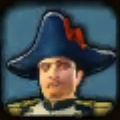 Leader of the French in Civilization Revolution 2 | |
| Era Bonuses | |
|---|---|
| Ancient | Knowledge of Pottery |
| Medieval | 1/2 price roads |
| Industrial | +2 Cannon attack |
| Modern | +1 Rifleman movement |
Napoleon leads the French in Civilization Revolution 2.
History[]
Napoleon Bonaparte (1769 - 1821 AD) was born in Corsica where he entered military school at ten. When the French Revolution broke out, Napoleon sided with the Revolutionaries and was appointed lieutenant-colonel of artillery, where he quickly made a name for himself as a successful commander. By 1794 he was a brigadier-general, and by 1795 he was appointed command of the French Army of the Interior. He was 25 years of age.
Taking advantage of political turmoil in Paris, in 1800 Napoleon overthrew the revolutionary government and named himself First Consul, with dictator-like power over all of France. An exceptional administrator, he rapidly reorganized the government, repealed the more radical and violent laws of the Revolution, and reopened the churches, gaining the love and respect of the French people, exhausted by years of revolution and chaos.
However, France was still at war with most of Europe, and Napoleon once again took to the battlefields, where he won stunning victories against Austria, causing that country and England to make peace. In celebration Napoleon declared himself Emperor and Consol for Life.
England remained nervous of France's imperial intentions, and war resumed in 1803. France soon found itself facing a daunting alliance that included England, Austria, Russia and Sweden.
Acting with amazing speed and cunning, Napoleon used his "interior lines" to concentrate his forces against the dispersed enemy. He moved his forces with unbelievable alacrity, and he was always able to bring them against the enemy's weakest spot. He crushed the Austrians, the Prussians, the Spanish, and the Austrians yet again.
Eventually Napoleon decided that he would never be safe in Europe as long as Russia, aided by the perfidious English, was on his flank, so he led half a million men to Moscow. The retreating Russian forces destroyed all foodstuffs along the way, while in the rear Cossack raiders destroyed his supply lines. While Napoleon did reach Moscow he was unable to maintain his army there, and he was forced to retreat in the middle of a bitter Russian winter. By the time he left Russia Napoleon had lost 96% of his army - some 480,000 men.
Napoleon's image of invulnerability was gone and all Europe rose against him. Though Napoleon was to again win famous victories, his enemies sensed weakness and continued their relentless attacks. Eventually the allies drove their way into Paris, and Napoleon abdicated. For his trouble he was given rulership of the island of Elba.
But this wasn't enough for Napoleon. Ten months later he re-entered France. The populace immediately went over to his side and he quickly regained his power and titles. He raised an army of 125,000 and headed to Belgium, where an English and Prussian force awaited him. At Waterloo, Napoleon was finally and irrevocably defeated by the English/Prussian forces under the leadership of English general Wellington. This time he was confined for life at the island of Sainte-Helena, a thousand miles from the coast of Africa. He died there in 1821.
Fun Facts[]
Soldiers under Napoleon's command during the invasion of Egypt discovered the Rosetta Stone in 1799. This discovery was the key to unlocking the secrets of the Egyptian hieroglyph system, which had previously been indecipherable.
To raise funds for the many wars he hoped to wage, Napoleon in 1803 offered up the whole of France's territory in North America to the United States. This sale, known as the Louisiana Purchase, more than doubled the size of the 27- year-old nation overnight.
See also[]
- Napoleon (Bonaparte) in other games
